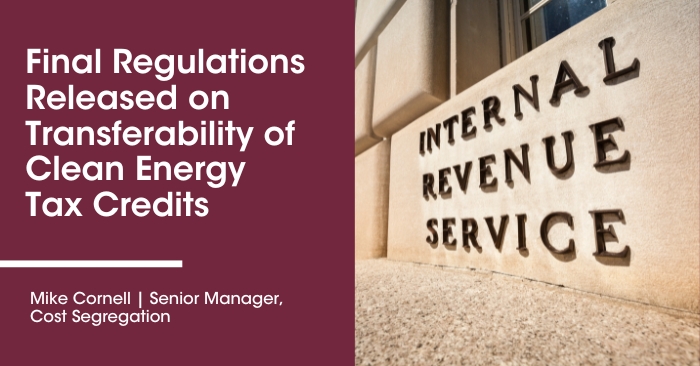By Mike Cornell | Senior Manager, Cost Segregation
On Thursday, April 25, the Department of Treasury and Internal Revenue Service issued final regulations regarding the transferability of certain clean energy tax credits in a taxable year, including specific rules for partnerships and S corporations.
The Inflation Reduction Act added Section 6418 to the tax code, providing taxpayers the ability to sell and transfer those credits to another taxpayer starting in 2023. Taxpayers can choose to transfer all or a portion of eligible energy tax credits to unrelated taxpayers for cash payments. Taxpayers buying the credits are then allowed to claim the transferred credits on their tax returns. The cash payments are neither included in the gross income of the seller nor deductible by those taxpayers buying tax credits.
The following clean energy credits are eligible for transfer:
- Energy Credit (Sec. 48), (Form 3468, Part VI)
- Clean Electricity Investment Credit (Sec. 48E), (Form 3468, Part V)
- Renewable Electricity Production Credit (Sec. 45), (Form 8835, Part II)
- Clean Electricity Production Credit (Sec. 45Y)
- Zero-emission Nuclear Power Production Credit (Sec. 45U), (Form 7213, Part II)
- Advanced Manufacturing Production Credit (Sec. 45X), (Form 7207)
- Clean Hydrogen Production Credit (Sec. 45V), (Form 7210)
- Clean Fuel Production Credit (Sec. 45Z)
- Carbon Oxide Sequestration Credit (Sec. 45Q), (Form 8933)
- Credit for Alternative Fuel Vehicle Refueling/Recharging Property (Sec. 30C), (Part 8911, Part II)
- Qualified Advanced Energy Project Credit (Sec. 48C), (Form 3468, Part III)
There are special rules related to excessive credit transfers and in many cases, recapture events – including rules for determining whether an excessive transfer or recapture event has occurred, the resulting tax impact, and the taxpayer responsible for that tax impact.
Finally, the final regulations provide rules for a mandatory IRS pre-filing registration process through an electronic portal. The pre-filing registration process must be completed, and a registration number received, prior to making an election to transfer eligible credits.
In order to maximize and prepare the credits for a transfer, a third-party consultant like KBKG is required. Contact us today to start the process.
Talk to Our Experts
About the Author
Mike Cornell | Senior Manager – Cost Segregation
Mike Cornell is a Senior Manager at KBKG. Mike has over 25 years of experience providing purchase price allocation, Cost Segregation, economic depreciation analysis, fixed asset analysis, and machinery and equipment valuation services. He has worked for Deloitte, RSM, and his own private consulting practice. Read More



